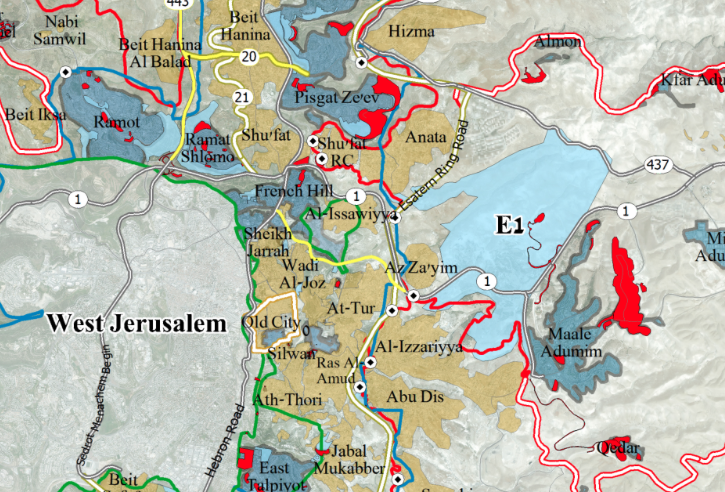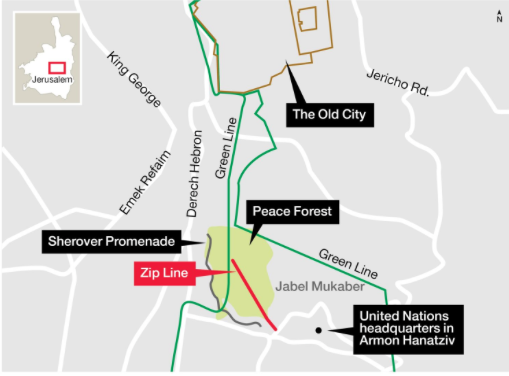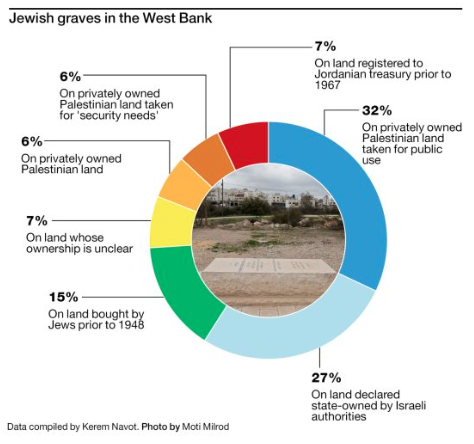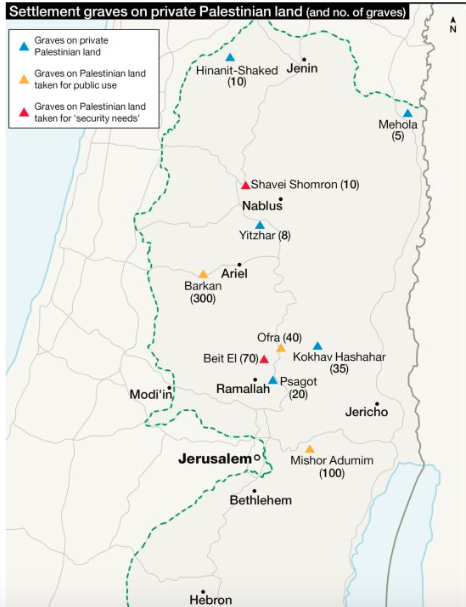Welcome to FMEP’s Weekly Settlement Report, covering everything you need to know about Israeli settlement activity this week.
To receive this report via email, please click here.
March 2, 2018
- Gutting Rule of Law for the Sake of Occupation: Two Important Cabinet Decisions
- Netanyahu Delays Har Bracha Settlement Expansion Plan, Citing Need to Conform to Understandings with Trump Admin
- Israel’s “Apartheid Road” Might Be Close to Opening
- Elad Settler Organization Gets Permit to Build a Zipline (yes, a zipline) Over East Jerusalem
- Exploiting the Dead to Steal West Bank Land
- Another New Jordan Valley Outpost
- IDF Razes Outpost Near Amichai Settlement (Again)
- B’Tselem on the Legalization of the Havat Gilad Outpost: “Adding Insult to Injury”
- Bonus Reads
Comments, questions, or suggestions? Email Kristin McCarthy at kmccarthy@fmep.org.
Gutting Rule of Law for the Sake of Occupation: Two Important Cabinet Decisions
During this week’s meeting of the Ministerial Committee for Legislation (a committee of Israeli government Ministers that votes on whether or not to give government support to legislative initiatives), committee members voted to endorse two bills that, in the service of the settlements, scrap even the pretense of respect for rule of law: one bill aims to retroactively legalize the unauthorized outpost of Netiv Ha’avot; a second bill seeks to restrict Palestinian access to the High Court of Justice.
The bill on behalf of Netiv Ha’avot outpost seeks to do a number of things.
- First, it seeks to grant official status to the entire outpost, some of which is on private Palestinian land and all of which was built without Israeli authorization (including required planning and approvals).
- Second, it would allocate funds ($8.3million USD) to cover the cost of building a new “temporary” outpost for some of the Netiv Ha’avot settlers who are due to be forced out of their homes imminently by a High Court ruling, based on the fact that these specific homes are partially built on privately owned Palestinian land and would not be saved by the new bill. These homes were slated for demolition next week (as FMEP covered in last week’s Settlement Report), but at the request of the Israeli government (which was pressed by the settlers), the High Court this week granted a 3-month delay to the demolition. The government plan to legalize Netiv Ha’avot does not attempt to save these homes.
- Third, the bill allocates funds ($6.8million USD) to compensate the settlers whose homes will be (or theoretically will be) demolished the structures that they built illegally on privately owned Palestinian land.
The second bill endorsed by the government this week, this one introduced by Justice Minister Ayeled Shaked (Jewish Home), seeks to strip the Israeli High Court of jurisdiction over West Bank land disputes. This would mean that Palestinians seeking legal recourse in land disputes with settlers would have their cases heard in the Jerusalem District Court. Shaked’s rationales for the bill are (a) to further extend and formalize Israel’s extraterritorial application of its domestic law and legal structures, giving an Israeli domestic court jurisdiction over non-citizen Palestinians living in territory that is beyond Israel’s sovereign borders; (b) to give settlers an advantage in court over Palestinian plaintiffs; and (c) to circumvent what Shaked sees (according to a Justice Ministry official) as the High Court being “overly concerned with international law and with protecting the rights of the ‘occupied’ population in Judea and Samaria.”
An official from the Justice Ministry told the Times of Israel that
“The expectation is that the District Court will be more flexible [than the High Court has been] with such cases in the future.”
Under Shaked’s proposal, some Palestinian cases could still reach the High Court of Justice, but only after the much more conservative Jerusalem District Court rules, adding time and cost to any Palestinian land petition.
Yesh Din representative Gilad Grossman commented:
“This bill is designed to indicate a kind of normalcy. [It is meant] to show that we’re not talking about an area conquered by one nation whose residents [Israelis] do whatever they want and no one enforces the law against them in an equal manner, but rather that these are conflicts between neighbors just like in Tel Aviv, Haifa or any other town within sovereign Israel.”
In a related development, Shaked recently installed – through sheer force of will – a new judge on the Jerusalem District Court. This judge, named Haya Zandberg, previously headed a government task force focused on retroactively legalizing outposts. Haaretz reports that in that capacity, Zandberg was involved in two major cases: one involving the Amona outpost and a second involving the Netiv Ha’avot outpost, in which she:
“adopted a creative pro-settler legal position that contradicted the views of both the Justice Ministry and the Israel Defense Forces’ legal adviser in the West Bank.”
And in a remarkably candid interview this week in the Washington Post, Shaked explained unabashedly the goal of her efforts to limit the jurisdiction of and otherwise weaken the High Court of Justice:
“I am trying to change the character of the court, so it will be more conservative and less interfering in government decisions, less activist.”
Netanyahu Delays Har Bracha Settlement Expansion Plan, Citing Need to Conform to Understandings with Trump Admin
At the same meeting in which Israeli government Ministers voted to endorse the two bills described in the section above (one to retroactively legalize Netiv Ha’avot and another to undermine Palestinian recourse the High Court in cases of settler land theft), Israeli Prime Minister Benjamin Netanyahu reportedly warned cabinet Ministers against green-lighting a plan to build 800 new units in the Har Bracha settlement. The project was promoted by settlers as a response to the recent murder of a settler who lived there. During a condolence visit in the settlement, the victim’s widow implored Netanyahu’s Chief of Staff, Yoav Horowitz, for “consolation and construction” in response to her husband’s murder by a Palestinian.
According to an official who was present for the Ministers’ meeting, Netanyahu told Cabinet Ministers:
“It is forbidden to advance a disproportionate amount of construction in a way that will break our understandings with the Trump administration.”
That same official also told the Times of Israel that Netanyahu also made clear that:
“he was still interested in promoting a construction project in the settlement and instructed his chief of staff to look into the matter.”
The right-wing media outlet Arutz Sheva reported the response of Yossi Dagan, the head of the Samaria Regional Council (the council with jurisdiction over settlements in the northern part of the West Bank:
“This is an important statement and an important step, and all of Israel expects to see a correct statement and immediate and determined action. Our enemies will know that any attempt to harm us will only strengthen us. The approval of 800 units in Har Bracha and the consequential turning of Har Bracha into a city is the fitting Zionist answer to this despicable murder.”
The 800-unit project would more than double the size of Har Bracha, which is near Nablus. In order to do so, it would require Netanyahu to approve a new Master Plan for the settlement. According to Israeli media, the Israeli Civil Administration previously advanced a Master Plan that would allow for a whopping 6,000 new units in Har Bracha, but under pressure from the Obama Administration, Netanyahu left the plan in limbo, where it remains today.
While the Cabinet didn’t vote on the Har Bracha plan this week, a few days after the Cabinet meet a settlement watcher for the Palestinian Authority reported that Israel seized 24 dunams of land belonging to the village of Burin, in order to pave a new road to Har Bracha.
Finally, it is unclear why Netanyahu cited U.S. pressure with regards to Har Bracha — that is, it is not clear whether he feels genuine pressure to moderate the pace of settlement expansion, or if he is using that argument for his own political reasons. This question is highlighted by the fact that, in the wake of the murder of a settler from Har Bracha, U.S. Ambassador David Friedman took to Twitter not only to condemn the murder but to note that he had previously donated an ambulance to the settlement. In a searing article in Haaretz, Israeli columnist Gideon Levy dug into the Ambassador’s humble brag, writing:
“With Friedman’s ambulance or without it, Har Bracha (literally, ‘Mountain of Blessing’) is a mountain of curses. It was a settlement established, like all the others, to poke a stick in the Palestinian eye and drive a stake into any chance of an agreement. A provocation. In the case of Har Bracha, the stick in the eye is palpable; it overlooks Nablus and threatens its development. Because of Har Bracha, Nablus periodically turns into a prison, as it was during the second intifada. Because of it and other settlements like it, the Israeli army ‘operates’ in Nablus as if it owns it, as it did during the past few days, indiscriminately wounding and killing as it hunted down the terrorist. When Har Bracha turns into a city, God forbid, Nablus, the former center of Palestinian economic and cultural life, will turn into a ghost town, dead, a ruined city. After all, that’s the goal. Whoever wants to turn Har Bracha into a city, like the Knesset speaker does, secretly wants to remove the Palestinians from Nablus. Anyone who believes in the two-state solution would of course have removed Har Bracha and its ilk a long time ago, or at least halted their malignant spread. ”
Israel’s “Apartheid Road” Might Be Close to Opening

Map by Ir Amim
The Israeli NGO Ir Amim reports that Israel has begun construction on an important segment of the so-called “Apartheid Road” near Jerusalem. The road – also called the “Eastern Ring Road” – earned its nickname because a wall literally runs down its middle, separating Israeli and Palestinian motorists. The road is meant to (a) more seamlessly connect Israeli settlements to Jerusalem; (b) facilitate Palestinian travel between the northern and southern West Bank, while preventing Palestinian drivers from accessing Jerusalem, and (c) overcome objections to Israel’s plans to build the E-1 settlement by creating “transportational contiguity” between the north and south of the West Bank. The solution is in itself a problem, and the road has faced legal battles contesting its implications, which are devastating to Palestinians and the territorial contiguity of a future Palestinian state.
The new construction – which started in October 2017 – is reportedly to build the key checkpoint controlling the flow of vehicles from the West Bank into (East) Jerusalem. Work on this northern segment – which was approved and funded in June 2017 – may signal that the road is nearly ready to be opened to traffic.
Elad Settler Organization Gets Permit to Build a Zipline (yes, a zipline) Over East Jerusalem

Map by Haaretz
Two months ago, the Jerusalem Municipality awarded a permit to the Elad settler organization to build a zipline connecting two popular tourist sites in Jerusalem, the Armon Hanatziv promenade and the Peace Forest in the Abu Tor neighborhood [learn more about Elad here]. Coming in at 2,570 feet, this will be Israel’s longest zipline and will travel over the Palestinian neighborhood Jabal al-Mukaber. According to Haaretz the permit was awarded quietly, based on a plan approved 40 years ago “to preserve open spaces around the Old City of Jerusalem while allowing for the construction of recreational and sports facilities, without requiring specific plans for each one.”
Peace Now’s Hagit Ofran said:
“[The settler organization] Elad is transforming the most precious asset in this country, the Old City of Jerusalem and its surroundings, into a cheap amusement park with tourist attractions like in Disneyland, and state authorities continue giving them these sites on a silver platter.”
The Jewish National Fund (JNF) – usually an ally, not an obstacle, when it comes to Elad projects – is challenging the construction of the zipline because the path is planned to go through the Jerusalem Peace Forest, which the JNF asserts requires a special permit.
Palestinians in East Jerusalem oppose both the plan itself and the extraordinary circumstances of its approval. Palestinian attorney Sami Ershied said:
“Elad is turning into a subcontractor of the authorities and the municipality to execute the policy of controlling the areas of the Old City and its surroundings. Giving the building permit is tainted by illegality and contradicts the outline plan for the area, which designates this area for a forest.”
Exploiting the Dead to Steal West Bank Land

Graph by Haaretz
Kerem Navot – an Israeli NGO founded by anti-settlement activist Dror Etkes – recently published new findings regarding the increasingly frequent practice of Israeli settlers to establish cemeteries as a way to expand their hold over West Bank land, both by taking new land and by establishing facts on the ground that will be especially difficult to reverse (Jewish custom holds that graves should not be moved). The latest example: the establishment of a cemetary at the outpost of Havat Gilad, for the burial of resident recently killed by Palestinians.

Map by Haaretz
Kerem Navot reports that there are now 32 cemeteries in the occupied territories – a significant rise from the two cemeteries in existence in the 1980s. Fourteen of those cemeteries (40%) are on land that is privately owned by Palestinians or on land where the ownership status is unclear. Fourteen others are on land that Israel has previously expropriated for “public use.” The cemeteries are typically built a good distance away from (and outside of) the border of the associated settlement, in effect taking over not just the land the cemetery is on, but the land linking it to the settlement.
Etkes explains to Haaretz:
“I work on the assumption that there are always deliberate intentions afoot…[the location] is not chosen for no reason. It is a very long-term investment – and in Judaism, whoever buries people in a certain place does so on the understanding they will not be removed…Obviously, there is deliberate intent lurking behind the location of these cemeteries and it may be assumed that whoever buries the dead on private Palestinian land knows exactly what he’s doing.”
Another New Jordan Valley Outpost
Haaretz reports that settlers in the Jordan Valley have set up a new outpost on grazing lands in the West Bank, the third new outpost in the area in the past 18 months. Haaretz reported:
“Late last week a few Israelis and a large herd of cows settled into an abandoned military base in the northern part of the Jordan Valley, according to Sami Tsadeq, head of the village of Al Aqabah, which lies just west of the abandoned base. He told Haaretz he believes these people are part of one family. They arrived on Wednesday, and on Thursday they built a fence to keep in their herd…
“Over the last 18 months two other unauthorized outposts have been established in the area, east of the Tayasir checkpoint. The method was the same – the arrival of one family with a large herd, assisted by Israeli youths and others. One outpost with a large flock of sheep was set up at al-Heima, as an extension of the outpost of Givat Sal’it, which is in the process of being authorized retroactively.”
IDF Razes Outpost Near Amichai Settlement (Again)
The Israeli army has demolished three structures in the Geulat Zion outpost, located on a hilltop in the West Bank’s Shiloh Valley. Established in 2011, the outpost is adjacent to the plot of land given to the settlers evacuated from the unauthorized Amona outpost early last year. Israel is currently building a new settlement, Amichai, on that land.
The Guelat Zion outpost residents (some of whom live there permanently and others who occasionally camp there), have caused problems for the IDF. Earlier this year, for example, some of them blocked the access rode to the Amichai site, preventing passage of Israeli construction vehicles. Why? Because the road to the new Amichai settlement runs through land that the outpost residents’ consider to be theirs.
NOTE: Early reporting on the process of establishing the new Amichai settlement – including in past editions of the Settlement Report – referred to the new official settlement as “Geulat Zion.” This is an error; Geulat Zion is an outpost nearby the site of Amichai.
B’Tselem on the Legalization of the Havat Gilad Outpost: “Adding Insult to Injury”
B’Tselem has released new documentation tracking the establishment of the Havat Gilad outpost, whose residents have terrorized and robbed local Palestinians since it was first established in 2002. As a reminder, the Israeli Cabinet Ministers voted to retroactively legalize the radical Havat Gilad outpost last month (FMEP reported on the legalization plan in the February 8th Settlement Report). B’Tselem’s report is an important reminder of how Israeli settlement activity has continued even when the government took an official decision in the 1990s to stop establishing new settlements. Instead, the government turned a blind eye (and, as documented in the Sasson Report, colluded to support) the establishment of hundreds of unauthorized “outposts,” and now the Israeli government is working to retroactively turn these outposts into official, “legal” settlements.
B’Tselem writes:
“The retroactive approval of settlements on various pretexts, such as the killing of settler Rabbi Raziel Shevah from Gilad Farm, or other excuses regarding other settlements, in no way changes their illegality. All the settlements, whether recognized or unofficial, are supported by government decisions, whether these are above board or beneath the table. All the settlements violate international law, advance the expropriation project and gravely violate the human rights of Palestinians in the West Bank.”
Bonus Reads
- “The Settlement Movement is Failing” (The Forward)
- “Israeli justice minister’s stealthy plan to annex the West Bank” (Al-Monitor)
FMEP has long been a trusted resource on settlement-related issues, reflecting both the excellent work of our grantees on the ground and our own in-house expertise. FMEP’s focus on settlements derives from our commitment to achieving lasting Israeli-Palestinian peace, and our recognition of the fact that Israeli settlements – established for the explicit purpose of dispossessing Palestinians in the West Bank and East Jerusalem of land and resources, and depriving them of the very possibility of self-determination in their own state with borders based on the 1967 lines – are antithetical to that goal.